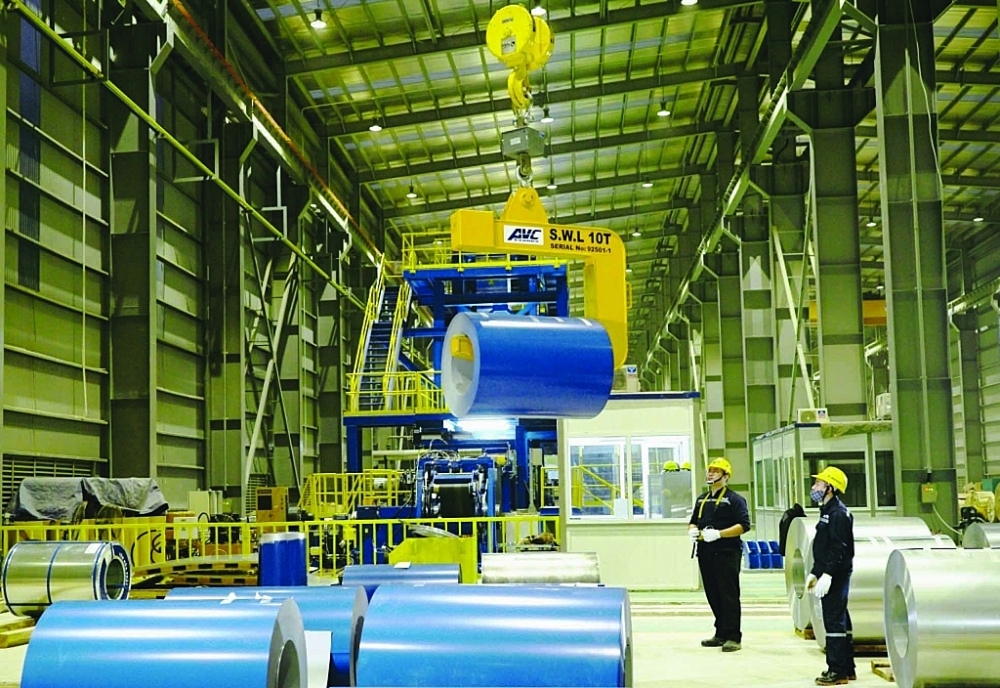Trade remedy lawsuits develop unpredictably
Although it has somewhat subsided in 2021, the development of trade remedy lawsuits in the following years is considered unpredictable, especially as Vietnam's economy is increasingly integrated into the world economy.
 |
|
Steel is one of the industries that frequently faces trade remedy investigations. Photo: Nguyen Thanh |
There are 160 cases in 10 years
According to the Steering Committee 35 (Ministry of Industry and Trade), the total import-export turnover of Vietnam has increased sharply from US$327.8 billion in 2015 to $543.9 billion in 2020. Export turnover increased by 11.7% on average in the period 2016-2020, reaching $281.5 billion in 2020, making Vietnam the 22nd largest country in the world in terms of export turnover and capacity.
Exports are one of the important drivers of economic growth, especially amid the pandemic. The balance of trade in goods had a surplus; the following year was higher than the previous year. However, the rapid growth of Vietnam's exports also puts pressure on manufacturing industries in the importing country. Therefore, along with the high growth in export turnover, Vietnam's export firms are increasingly likely to become the subject of investigations and trade remedies.
The number of trade remedy cases with Vietnamese exports has increased rapidly in recent years. By the end of July, Vietnam's export goods had been the subject of 207 foreign trade remedy investigation cases. Notably, the number of cases investigated from 2011 to now has hit 160 cases, accounting for 77%.
Steel is one of the industries that frequently faces trade remedy investigations. Trinh Khoi Nguyen, Vice Chairman of the Vietnam Steel Association, said in the past, exports often faced trade remedy cases from markets such as the US, Australia, Canada, etc., but recently, even the Vietnam's traditional markets in Southeast Asia such as Thailand, Malaysia, Indonesia, and the Philippines export goods also encountered many lawsuits.
"It is a manifestation of the continued increase in trade remedies in countries and export markets," Nguyen said.
Enhanced early warning
Around the problem of the trade remedy lawsuit set in the context of the Covid-19 epidemic, Ms. Pham Chau Giang, Deputy Director of the Trade Remedies Department (Ministry of Industry and Trade) analysed, the past time as well as the present time, the epidemic Covid-19 affects the world economy and in Vietnam under very unpredictable directions.
The year of 2020 is the early stage of the epidemic, businesses all have a feeling of panic and anxiety, trying to sell as many goods as possible, limit ing inventories, leading to a "falling in price" of goods around the world. ", the competitiveness of firms is narrowed. 2020 is the year with the most trade remedies being applied. For the first time, Vietnam's export goods faced a record number of trade remedy lawsuits of 40 cases. This number doubles, even triples compared to many years ago.
However, the year of 2021 contrasts to the year of 2020. Due to the disruption of the global manufactured goods supply chain, the prices of many basic commodities such as iron and steel, fertiliser, plastic, rubber, etc. have increased. This leads to the situation that economies around the world hardly investigate the application of trade remedies. Up to now, Vietnam‘s export goods have been investigated by other countries, applying about 10 trade remedy cases.
“However, such developments are short-term, not sustainable; it is difficult to predict what the trend of 2022 will be. We always have to closely monitor the price movements, production supply and consumption demand of commodities in Vietnam's fundamental industries in order to have a prediction orientation on the trend of trade defense in the future,” said Ms. Giang.
In fact, the Ministry of Industry and Trade has also worked with relevant ministries and branches to implement many activities to promptly support Vietnamese businesses when countries increase use of trade remedies to protect domestic production. In particular, it is the most notable to be the construction and operation of an early warning system on trade remedies. Currently, the Ministry of Industry and Trade is monitoring the export fluctuations of 36 items and issuing a warning list of 10 items among the items being monitored for ministries, branches, localities, associations and firms to deploy specific activities.
Since the time the Ministry of Industry and Trade first announced the warning list in July 2019, there have been seven products on the warning list being investigated by foreign countries for trade remedies, namely plywood with materials made from hardwood, foam padding, car tires, copper pipes, honey, and anti-corrosion steel and ceramic tiles. Through early warning work, ministries, branches, localities and businesses have not been passive in responding to foreign trade remedies.
A representative of the Ministry of Industry and Trade said that in the future, the Ministry will continue to work with relevant agencies to complete, build and operate more effectively the early warning system according to the roadmap in the Construction and Operation Project under effective implement of the trade remedy early warning system approved by the Prime Minister on March 1, 2020. The main purpose is to monitor, warn and support trade remedy investigation agencies and related agencies in investigating and handling domestic and foreign trade remedy cases, protecting domestic production, preventing and responding to foreign trade remedy lawsuits, towards sustainable exports.










